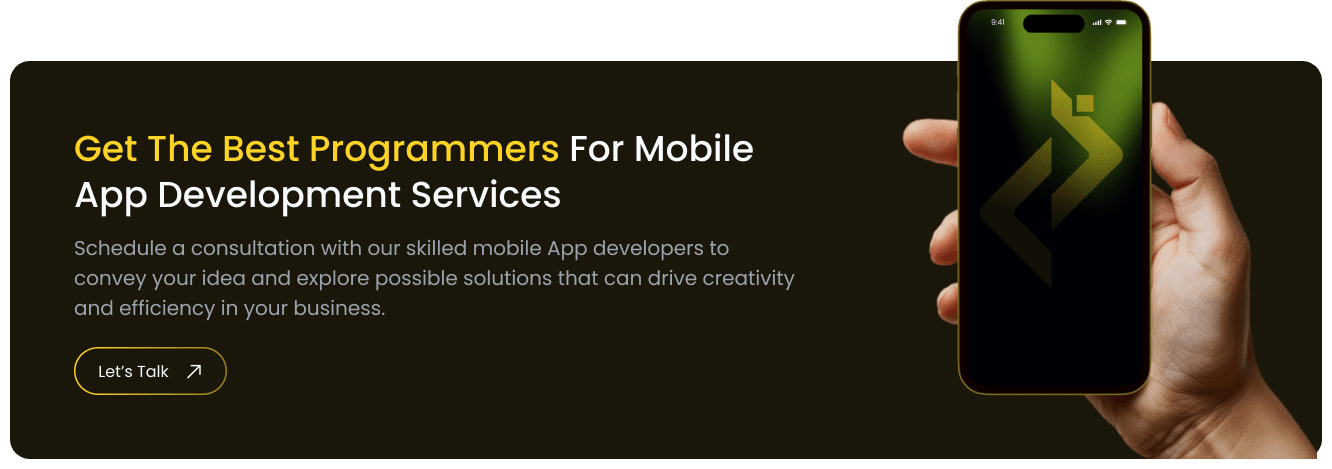Best Programming Languages for Mobile App Development in 2024!
Nidhin N P
August 6, 2024
5 Min read

When developing mobile apps, the programming language you use may make a big difference in how well the app works. Since technology is always changing, it's critical to keep up with the newest trends and the best language for mobile app development used in the field. There will be plenty of possibilities and fierce competition in 2024 for anyone looking to create iOS and Android apps. Discover the top programming language for mobile apps by exploring the best choices for this year's mobile app development.
The Reigning Champion for iOS Development: Swift
Swift has established itself as the go-to iOS app development languages for creating Apple apps and is still dominating the iOS development scene. Since its release, Swift has completely changed the way iOS developers approach projects by fusing cutting-edge syntax with strong security features to improve speed. Swift 6's improvements, which were introduced in 2023, have only strengthened the platform's reputation by providing developers with a wide range of effective tools and capabilities.
Using frameworks and APIs like UIKit and SwiftUI, this programming language for mobile apps not only performs very well at developing slick, native iOS applications, but it also connects with Apple's ecosystem seamlessly. Swift is a valuable tool for developers who want to create high-quality iOS applications because of its commitment to speed, safety, and software design principles. Its quick acceptance and the developer community's warm reception highlight its critical role in establishing new standards for the quality of iOS apps.
Kotlin: The Preferred Choice for Android Apps
With the rise of Kotlin— the Android app development languages, Java has become less popular when it comes to developing dependable, contemporary Android apps. With its clear syntax, null safety features, and smooth Java integration, Kotlin—which was first released by JetBrains and formally adopted by Google in 2017—has completely changed the Android development landscape. With the language's compatibility with all Java libraries and frameworks and its ability to drastically minimize boilerplate code, developers may create programs that are more error-free and efficient. The fact that Kotlin is integrated with Android Studio adds to its allure by offering developers a seamless working environment with features made expressly to make coding easier. As Kotlin develops further, its emphasis on security, clarity, and tooling support sets it apart as the best option for Android app developers hoping to live up to the high standards of the 2024 mobile app industry.
Cross-Platform Possibilities: Flutter and Dart
The Flutter framework combined with the Dart programming language for mobile apps is a great option for developers who want to move between iOS and Android programming with ease. Google created Flutter to give developers the ability to create natively built applications from a single codebase. By doing this, the development process is expedited and platform-wide uniformity in performance and look is guaranteed. The programming language Dart, which underpins Flutter, is praised for its versatility and simplicity. For individuals who are familiar with standard OOP languages, its syntax is straightforward, which facilitates the transfer for new adopters.
One of the most notable aspects of Flutter is its quick reload functionality, which greatly boosts productivity and makes development cycles more dynamic by enabling developers to see the results of their changes instantly. Dart also produces apps that are fast to design and execute because of its emphasis on optimization and efficient compilation.
Flutter's large collection of widgets makes it even more enticing, allowing developers to create aesthetically pleasing user interfaces that nearly resemble native components. With its wide selection of widgets and Dart's performance-oriented design, Flutter is a leading cross-platform development tool. Its capacity to provide apps that are just as reliable and easy to use as their native equivalents is demonstrated by the increasing popularity of the platform among developers.
React Native and JavaScript: The Hybrid Heroes
React Native is unique in that it makes it possible to create cross-platform applications using JavaScript and React that provide a native-like user experience. This method greatly streamlines the app development process by utilizing the vast ecosystem and library of components that React Native offers. It makes it possible to use a wide range of pre-built parts, which expedites the construction process and makes it possible for apps that must be compatible with both the iOS and Android app development languages to reach the market more effectively.
Many web developers are already familiar with JavaScript, which is the foundation upon which React Native is based. For those who wish to start developing mobile apps without having to tackle the difficult learning curve associated with native programming languages, React Native offers an approachable beginning point.
Because of its smooth interaction with both iOS app development languages and Android platforms and its capacity to reuse resources and code, React Native is a very desirable choice for projects where timeliness and cost-effectiveness are critical. When paired with JavaScript's flexibility and reach, React Native's ability to imitate native app behaviors makes both languages essential tools for developers planning to take on the challenges of developing dual-platform apps in 2024.
Conclusion
The landscape of mobile app development in 2024 offers a diverse range of programming language for mobile apps, each designed to meet specific development needs and goals. For those pursuing native app development, Swift for iOS and Kotlin for Android stand out with their modern features and robust community support, ensuring reliable and optimized user experiences. On the other hand, developers interested in cross-platform solutions might find React Native with JavaScript or Flutter with Dart to be more suitable, as these technologies enable the creation of high-quality apps that deliver a native-like experience on both major platforms.
At Pixbit Solutions, we understand the importance of selecting the right programming language tailored to your project’s unique requirements. Whether you’re targeting specific audiences, incorporating essential features, or adhering to a tight development timeline, our expertise in mobile app development ensures that we align our choices with your project’s goals. By considering these factors and leveraging the strengths of various technologies, Pixbit Solutions can help you create a successful mobile app that resonates with users and thrives in the evolving digital landscape of 2024.

Nidhin N P
Tech Lead at Pixbit Solutions
Share on
Have an idea that needs to go mobile? Launch it with us!
Have an idea that needs to go mobile? Launch it with us!
Let's Talk
Have an idea ?
Let's make it happen
Tell us your business aspirations, and let's craft a custom solution that drives business growth, ensuring satisfaction and exceeding your goals with precision.
Let's Talk